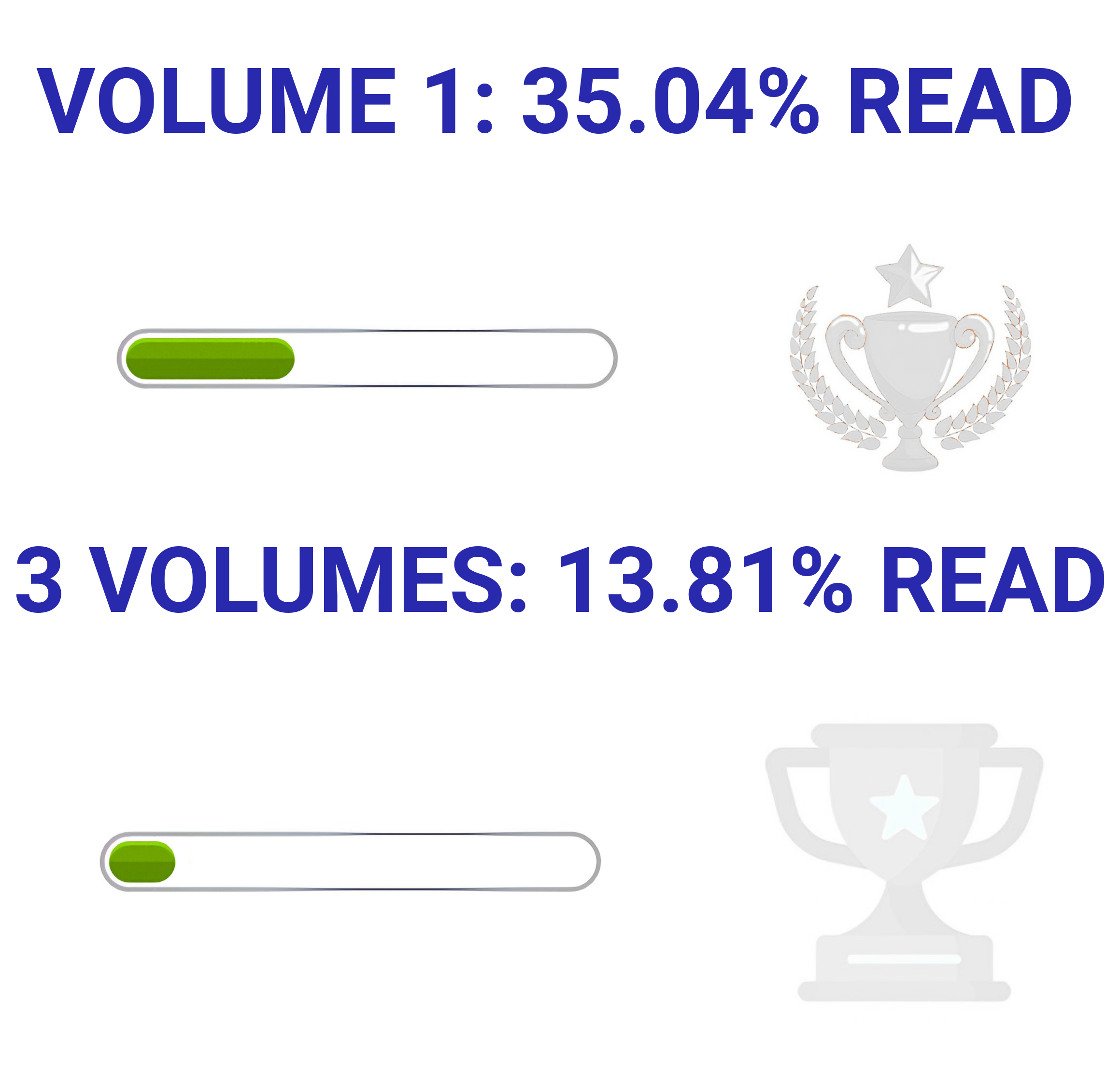Ok comrades, we have quite a bit done, we are well into our stride. Look at those fat juicy progress bars: while there is still a long way to go, remember how recently they were just a flimsy few pixels. Last week we left behind Dickensian factories and looked at the liminal space between master crasftsmen's workshops and the drone-work on assembly lines. Now we are going to get into more detail on how that change happens, and how factory-work takes hold of society.
Don't forget that this is a club: it is a shared activity. We engage with Karl Marx, and we also engage with each other in the comments and build camaraderie.
The overall plan is to read Volumes 1, 2, and 3 in one year. (Volume IV, often published under the title Theories of Surplus Value, will not be included in this particular reading club, but comrades are encouraged to do other solo and collaborative reading.) This bookclub will repeat yearly. The three volumes in a year works out to about 6½ pages a day for a year, 46⅔ pages a week.
I'll post the readings at the start of each week and @mention anybody interested. Let me know if you want to be added or removed.
Just joining us? It'll take you about 15-16 hours to catch up to where the group is. Use the archives below to help you.
Archives: Week 1 – Week 2 – Week 3 – Week 4 – Week 5 – Week 6 – Week 7
Week 8, Feb 19-25, we are reading from Volume 1: what remains of Chapter 14 (i.e. sections 3,4 and 5), plus section 1 of Chapter 15
In other words, aim to reach the heading 'The Value Transferred by Machinery to the Product' by Sunday
Discuss the week's reading in the comments.
Use any translation/edition you like. Marxists.org has the Moore and Aveling translation in various file formats including epub and PDF: https://www.marxists.org/archive/marx/works/1867-c1/
Ben Fowkes translation, PDF: http://libgen.is/book/index.php?md5=9C4A100BD61BB2DB9BE26773E4DBC5D
AernaLingus says: I noticed that the linked copy of the Fowkes translation doesn't have bookmarks, so I took the liberty of adding them myself. You can either download my version with the bookmarks added, or if you're a bit paranoid (can't blame ya) and don't mind some light command line work you can use the same simple script that I did with my formatted plaintext bookmarks to take the PDF from libgen and add the bookmarks yourself.
Audiobook of Ben Fowkes translation, American accent, male, links are to alternative invidious instances: 1 – 2 – 3 – 4 – 5 – 6 – 7 – 8 – 9
Resources
(These are not expected reading, these are here to help you if you so choose)
-
Harvey's guide to reading it: https://www.davidharvey.org/media/Intro_A_Companion_to_Marxs_Capital.pdf
-
A University of Warwick guide to reading it: https://warwick.ac.uk/fac/arts/english/currentstudents/postgraduate/masters/modules/worldlitworldsystems/hotr.marxs_capital.untilp72.pdf
-
Reading Capital with Comrades: A Liberation School podcast series - https://www.liberationschool.org/reading-capital-with-comrades-podcast/

Can someone explain this?? It sounds like he's saying there are two things:
A. Analyse really-existing religions like Xtianity economically.
B. Develop religions from economic analysis
and that B is better (more materialist, more scientific) than A
....but that doesn't make sense. Developing religions is a weird exercise that should be left to people like J.R.R. Tolkein. Why would Marx praise "develop[ing].... celestialised forms"???? I must be misreading something.
Marx is saying to develop celestialised forms of social relations, to create (simplified!reductive!abstract!) models to understand the process of production, of politics, etcetc. And he is saying these models need to be developed by looking at the "actual relations of life" rather than by analysing "the misty creations of religion" to find it's "earthly core".
The system described in Das Kapital is such a celestialised (in Fowkes TL, "apotheosized") form of the capitalist mode of production. Marx's issue with Christianity (or any other organized religion in class society) is that it reflects and sanctifies a topsy-turvy world. His issue with Christianity isn't that it believes in Man in the Sky; it is that the priests often say "don't revolt; give tithes; you'll get back tenfold in heaven".
If we use an example, the history of the land of Palestine can be studied starting from the "misty creations of religion", i.e. from the various books of the Bible, or it can be studied starting from the "actual relations of life", i.e. from archaeological evidence. Similarly, the Roman empire can be studied starting from the misty creations of its histories, written by and for the ruling class (and often including fantastic or unbelievable elements), or it can be studied starting from the archaeological and material evidence.
Good scholars of either generally make use of both sorts of sources ofc (as Marx says, there is an earthly core).
The quote also makes more sense when read with the preceding sentence "Even a history of religion...is uncritical". Religion isn't the focus here; it's just one example of a misty creation.
And then the sentence before that is where Marx's key point is; we should be looking at the technology (not just material, but also in terms of organization) societies use for production as the basis for examining their histories instead of looking at e.g. their luxury goods and spiritual / academic stuff (as we do for the celts and romans/greeks respectively) or what their tools were made of (as we do for prehistory).